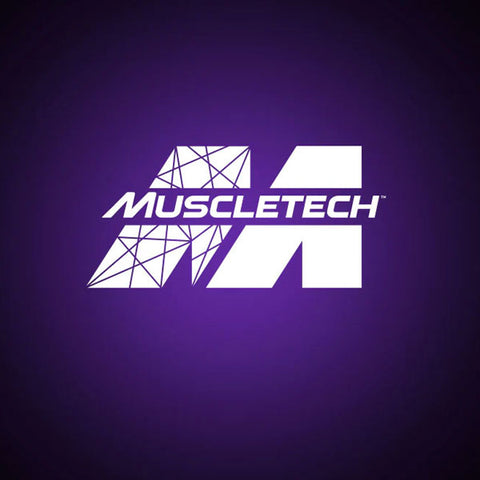Glutamine is one of the most abundant amino acids in the human body. (1) It plays several crucial roles in fitness and health, including muscle protein synthesis, energy production, immune function, and gut health. (2)
You can find it inside protein-rich foods and supplements such as MuscleTech’s Platinum 100% Glutamine or NitroTech, and it is also synthesized by the body endogenously. (2)
In this article, we’ll dive into the guidelines around glutamine supplementation, with an emphasis on proper timing for maximal benefits.
We will also explore how glutamine supports muscle growth, recovery, and sports performance as well as when the best time to take glutamine is to yield the best results possible.
Table of content
What is Glutamine?
Glutamine is one of the non-essential amino acids that the body can synthesize. (1) It is chemically known as L-glutamine and is structurally composed of carbon, hydrogen, nitrogen, and oxygen. It is one of the body's twenty amino acids and plays important roles as a building block to protein.
Glutamine’s Role In The Body
Glutamine can be found pumping through the bloodstream and within the brain, muscles, gut, liver, lungs and adipose tissue. (3) Glutamine serves as the primary transporter molecule of nitrogen between tissues and, therefore, plays a pivotal role in maintaining the nitrogen balance in the body. (2))
In addition to maintaining the body's nitrogen balance, glutamine also serves as a precursor for synthesizing other amino acids and neurotransmitters necessary for different physiological functions. (2)
These include enhancing the immune system by optimizing the function of macrophages, a type of white blood cell, and promoting increased gut health. (2)
Sources of Glutamine
1. Food Sources
Since glutamine is an amino acid, it is found in high amounts in protein-rich foods. These include animal products such as meat, pork, poultry, and fish. (3) Since these food items have protein structures similar to humans, they are particularly useful for consuming the amino acids you need.
In addition to these foods, items like milk, cheese, yogurt, and eggs also offer high amounts of glutamine and can contribute to your overall amino acid intake. (3)
Plant-based foods like red cabbage, and nuts such as cashews and almonds can also be a good source of glutamine for those who choose not to consume animal products. (3) Other sources of glutamine that are not animal sources include legumes, spinach, kale, parsley, seeds, and soy products.
2. Glutamine Supplements
Supplementing it with a high-quality glutamine powder such as MuscleTech’s Platinum 100% Glutamine can be a good idea if you struggle to consume enough glutamine in your diet.
Whether you restrict your total calories, avoid animal products, or increase your training volume, a glutamine supplement can help bolster the endogenous amount synthesized within the body. (2) This allows you to maintain the health benefits that consuming it provides.
Synthesis in the Body
As mentioned, glutamine can be synthesized within the human body, most abundantly within skeletal muscle and lung tissue, but also receives contributions from the liver and adipose tissues (fat cells). (3)
The creation of glutamine inside the body depends on chemical reactions that include other amino acids, enzymes, ammonia, and adenosine triphosphate (ATP). (3)
This continuous supply of glutamine is critical for tissues that require it, such as the brain, the intestine, and the kidney. It is essential during periods of low-calorie intake, such as cutting phases or fasting. (3)
Fitness Benefits of Glutamine Supplementation
1. Muscle Growth & Recovery
Glutamine plays an essential role in muscle protein synthesis, which is the mechanism for building new muscle tissue and recovering from exercise-related muscle damage. (1)
In addition to the glutamine synthesized by the body and diet, supplementing with glutamine can provide ample amounts so that all body tissues have enough to stimulate vital functions they control.
In periods of low glutamine availability, more essential bodily functions such as brain, kidney, and immune system function may be prioritized over muscle tissue growth.
But when ample amounts of glutamine are in the diet, you can prevent this rationing of glutamine stores and optimize its effects on your training adaptations.
2. Minimizing Muscle Breakdown
Glutamine supplementation has also shown a positive impact on minimizing muscle breakdown in a catabolic state. (3) Muscle catabolism is the process of breaking down muscle tissue for energy, and it occurs during long bouts of calorie restriction in the presence of inadequate calories based on activity levels.
Muscle breakdown commonly occurs in intense fitness training, where the body breaks down muscle tissue for fuel. This often happens in physically exhausted athletes, such as in long-distance aerobic events where calorie demand is high, and food consumption is low. (3)
During long-distance events, the endogenous synthesis of glutamine may be insufficient to meet the body's demands, but supplementing with glutamine can counteract this. (2)
3. Glycogen Synthesis
Glutamine can also play a significant role in the synthesis of glycogen, the storage form of carbohydrates. (2) This is important for replenishing energy stores within the muscle and liver after training.
As you train, muscle glycogen stores are depleted as carbohydrates are the preferred macronutrient for training. By supplementing with glutamine post-exercise, you can enhance the amount of glycogen produced and stored, making you better prepared for the next day's workout. (2)
4. Lactic Acid Buffer
Lactic acid production is common with intense exercise. Although lactate can be recycled as a fuel source, the build-up of creatine kinase and lactate dehydrogenase is a marker of muscle damage and oxidative stress. (2)
Supplementing with glutamine can improve ammonia removal within the muscle and buffer the buildup of creatine kinase and lactate dehydrogenase, allowing you to exercise at higher intensities for longer. (2)
How Much Glutamine Should You Take?
Research supports that consuming 5g of glutamine daily is adequate. However, in populations that partake in intense physical activity, you may need more to supplement the endogenous supply your body makes. In this instance, 20-30 grams of glutamine daily are tolerated well. (4)
When determining dosage, consult a healthcare professional to ensure proper intake and consider your goals, body size, and activity level.
When Should You Take Glutamine?
1. Pre-Workout
Research on glutamine supplementation before exercise is conflicting. Some studies support it as an ergogenic aid, while others show no benefit. (1)
In some studies, glutamine as a pre-workout supplement can delay the time to fatigue, reduce the perception of effort level, and decrease markers of muscle damage. (2)
A study on soccer players showed that a glutamine and carbohydrate solution given to subjects thirty minutes before an intermittent exercise test improved performance and perceived level of effort compared to taking a carbohydrate solution only. (2)
2. Post-Workout
Consuming glutamine post-workout is commonly practiced to help support muscle protein synthesis, enhance immune function, and help increase glycogen synthesis for subsequent sessions. (2)
Taking a glutamine supplement post-workout has also been shown to be effective in reducing delayed-onset muscle soreness after training. (1)
Most beneficial studies on glutamine supplementation have used a post-workout supplement routine. For example, a study on individuals performing a thirty-minute glycogen-depleting workout on the cycle ergometer showed positive effects using glutamine supplementation immediately post-exercise. (2) They were given a glutamine and carbohydrate mixture and had increased glycogen resynthesis compared to the placebo group.
Another study on glutamine combined with protein and creatine in subjects performing a 12-week resistance training program increased the number of repetitions at 80% one-rep max to failure on the lat pull and bench press. (2) Do you know what is the best time to take creatine?
Which Supplement Strategy Is Optimal?
Everyone is unique in their response to a supplementation protocol. However, glutamine is best taken post-workout over a more extended period to reap its benefits for health and fitness improvements.
After your workout, the body is primed for nutrient absorption and delivery. Consuming glutamine during this time can help with its uptake and promote the desired effects, such as increased muscle protein synthesis, accelerated glycogen replenishment, and reduced muscle soreness from exercise.
Additionally, glutamine's effect on the immune system can be particularly beneficial post-exercise, since the stress from training may impact immune function short-term.
Glutamine Supplement Highlight
If you are looking for a high-quality glutamine supplement, look no further than Muscle-Tech’s Glutamine 100%.
Platinum 100% Glutamine provides 5g of pure glutamine without any fillers or additives to help you replenish the glutamine stores lost during exercise and promote recovery with absolutely zero banned substances found in it.
Glutamine 100% is perfect for post-workout recovery since you can have it with water or any beverage you prefer. It can easily be matched with any post-workout protein or carbohydrate sources you’re taking.
Incorporating it into your post-workout routine lets you rest easily, knowing that your endogenous glutamine production is bolstered by an ultra-pure and effective HPLC-tested and verified supplement.
Wrapping Up On When To Take Glutamine
Glutamine is a valuable supplement for athletes seeking health and fitness gains. Its ability to promote muscle recovery, reduce muscle breakdown, and aid in glycogen synthesis shows how fitness enthusiasts like yourself can utilize it.
However, knowing when to take it is an important factor to consider. Based on the available research, it seems that taking glutamine post-workout over several weeks is your best option for maximizing its effects.
Although some research supports it as an ergogenic aid before exercise, the results of these studies are conflicting, with some major organizations labeling it as having no effect at all.
Thus, incorporating it into your post-workout routine to assist in post-workout refueling and recovery is optimal.
If you are looking for your next glutamine supplement, be sure to purchase Glutamine 100% so that you can start bolstering your body's glutamine production and enhancing your fitness gains!
References:
- Kerksick, C. M., Wilborn, C. D., Roberts, M. D., Smith-Ryan, A., Kleiner, S. M., Jäger, R., Collins, R., Cooke, M., Davis, J. N., Galvan, E., Greenwood, M., Lowery, L. M., Wildman, R., Antonio, J., & Kreider, R. B. (2018). ISSN exercise & sports nutrition review update: research & recommendations. Journal of the International Society of Sports Nutrition, 15(1), 38. https://doi.org/10.1186/s12970-018-0242-y
- Coqueiro, A. Y., Rogero, M. M., & Tirapegui, J. (2019). Glutamine as an Anti-Fatigue Amino Acid in Sports Nutrition. Nutrients, 11(4), 863. https://doi.org/10.3390/nu11040863
- Cruzat, V., Macedo Rogero, M., Noel Keane, K., Curi, R., & Newsholme, P. (2018). Glutamine: Metabolism and Immune Function, Supplementation and Clinical Translation. Nutrients, 10(11), 1564. https://doi.org/10.3390/nu10111564
- Gleeson M. (2008). Dosing and efficacy of glutamine supplementation in human exercise and sport training. The Journal of nutrition, 138(10), 2045S–2049S. https://doi.org/10.1093/jn/138.10.2045S








